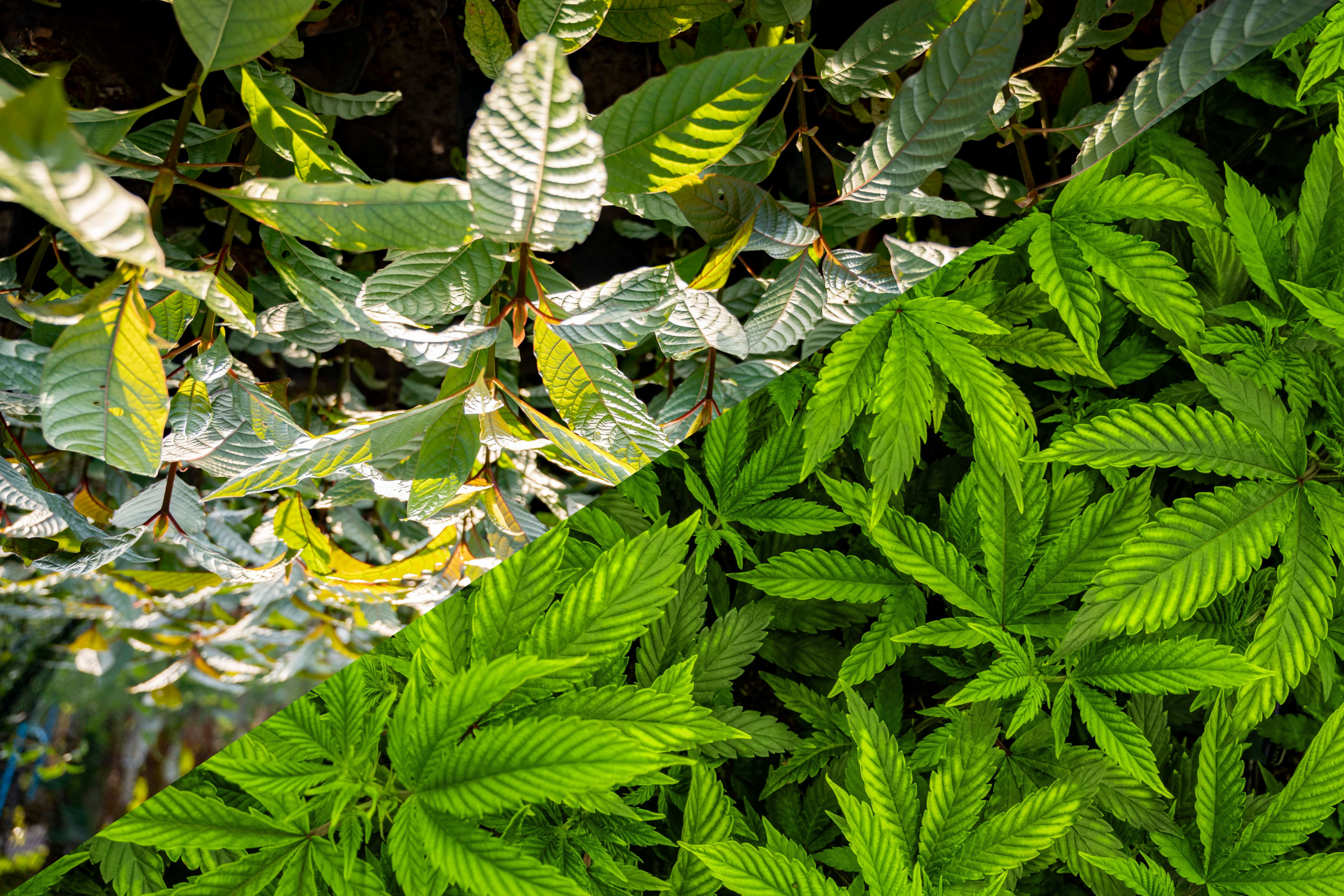CBD and kratom are two plant-derived products that often appear in the same wellness conversations, yet they come from completely different traditions, regions, and biological systems.
As interest in natural alternatives grows across the United States, so does the need for clear, research-led information that helps people understand what separates these two botanicals. CBD is widely available in oils, gummies, capsules, and topical forms, while kratom is mostly sold through specialised vendors such as Happy Go Leafy, offering powder, capsules, and liquid extracts.
Both plants have their own characteristics, benefits, limitations, and safety considerations. This guide breaks down how they differ so users can make informed choices.
[420 NEWSLETTER]: Don't Miss The Best New Strains Hitting The Market
CBD vs Kratom: Where Do They Come From?
Before comparing their effects, it’s helpful to look at where CBD and kratom come from and what sets their plant sources apart.
CBD (Cannabidiol)
CBD is a naturally occurring compound extracted from hemp, a variety of Cannabis sativa. Under U.S. federal law, hemp must contain less than 0.3% THC, which keeps CBD products non-intoxicating. This hemp is used to produce CBD oils and edibles designed for everyday balance and wellness.
Kratom (Mitragyna speciosa)
Kratom comes from a tropical evergreen tree native to Southeast Asia. The leaves contain alkaloids, primarily mitragynine, that interact with the body in a completely different way than cannabinoids. Kratom is sold mainly in powder and capsule form, often labelled by strain type such as Maeng Da, Bali, or Malay.
CBD vs Kratom: How Does Each One Work in the Body?
To understand their effects, it helps to look at how CBD and kratom act inside the body and the pathways they each rely on.
How CBD Works?
CBD interacts with the body’s endocannabinoid system (ECS), which helps regulate mood, sleep, appetite, and general balance. Because CBD does not directly activate CB1 receptors, it does not produce a “high.” Many users prefer CBD for its steady, non-intoxicating nature and ease of integration into a daily routine.
How Kratom Works?
Kratom interacts with opioid receptors, even though it is not classified as an opioid. Different strains and doses may produce different effects. Lower amounts are often described as more energising, while higher amounts may feel more sedating. Research into kratom’s mechanisms is still developing, and its effects can vary more widely than CBD.
Common Forms and How People Use Them?
Their formats vary widely, so understanding the common ways CBD and kratom are used helps clarify how each fits into everyday life.
CBD Formats
CBD is widely accessible and comes in multiple user-friendly forms:
- Oils and tinctures
- Gummies
- Softgels and capsules
- Topicals
- Vapes
Kratom Formats
Kratom products typically appear in:
- Powder
- Capsules
- Crushed leaves
- Liquid extracts
How CBD and Kratom Feel Different?
Their effects don’t overlap much, so comparing how CBD and kratom typically feel can help people decide which fits their needs.
CBD’s Typical Effects
Most people describe CBD effects as subtle and gradual. Common reasons people gravitate toward CBD include:
- Promoting calm
- Supporting a sense of balance
- Helping unwind without intoxication
- Providing daily wellness support
CBD does not impair cognition and is considered non-intoxicating, even in higher concentrations.
Kratom’s Typical Effects
Kratom’s effects depend heavily on strain and dosage:
- Lower doses may feel stimulating or uplifting
- Moderate to higher doses may feel calming, grounding, or heavier
Because of its receptor activity, kratom may feel more intense and variable than CBD.
Legal Status in the United States
CBD and kratom follow very different legal paths in the United States, and understanding those regulations is an important part of using them responsibly.
CBD Legality
CBD derived from hemp (≤0.3% THC) is federally legal in the United States under the 2018 Farm Bill. State laws vary, but CBD products are widely available nationwide.
Kratom Legality
Kratom is federally legal but regulated differently across states:
- Legal in most U.S. states
- Restricted or banned in a few states and municipalities
- Regulations may change depending on ongoing safety evaluations
Consumers should always check local laws before buying or using kratom.
CBD vs Kratom: Key Differences
A simple comparison helps highlight how differently CBD and kratom function, despite often being discussed together.
| Feature | CBD | Kratom |
| Plant Origin | Hemp (Cannabis sativa) | Mitragyna speciosa tree |
| Primary Compounds | Cannabinoids | Alkaloids |
| Intoxication | Non-intoxicating | Dose-dependent; can be sedating |
| Interaction | Endocannabinoid system | Opioid receptors |
| Availability | Widely available under hemp laws | Legal in most states; restricted in some |
| Stability | Consistent effects | Strain and dose-dependent |
Which One Should You Choose?
CBD and kratom serve different types of users and preferences. CBD offers gentle, consistent effects suitable for daily wellness routines, making it an easy entry point for beginners. This is why many users gravitate toward reliable CBD products, especially when they want clarity and balance without intoxication.
Kratom may appeal to people seeking more pronounced or strain-specific effects, but it requires more caution, more vendor research, and awareness of state laws. Anyone interested in kratom should seek out the best kratom brands with transparent lab results and clean sourcing.
Final Thoughts
CBD and kratom may appear in similar conversations, but they operate in very different ways. CBD interacts with the ECS and provides steady, non-intoxicating support. Kratom interacts with opioid receptors and can produce a wider range of effects, such as relaxation, better mood, or energy, depending on dose and strain.
For users looking for a dependable wellness option, CBD from trusted companies offers a more consistent and approachable experience. At the same time, kratom requires careful, informed use and responsible sourcing.
[420 NEWSLETTER]: Don't Miss The Best New Strains Hitting The Market

